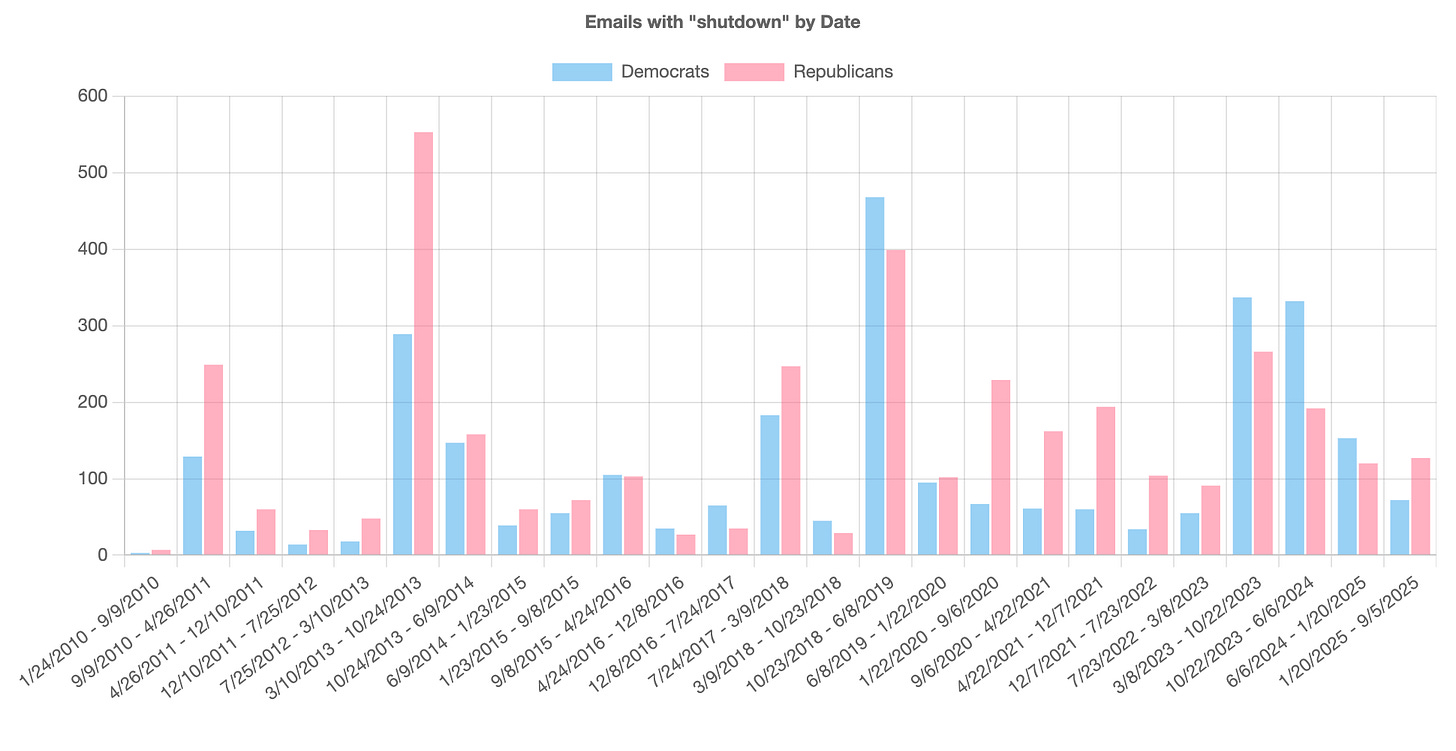Government Shutdown Pre-Game
How members of Congress are messaging on the potential September 30 Shutdown
We’ve got 22 days to avoid a government shutdown. The current U.S. budget expires on September 30th, and unless Congress passes the Fiscal Year 2026 appropriations bills, the federal government will partially close.
Already, both sides have started the annual blame game over who will “own” a shutdown. With a united Republican government in Washington, there isn’t a structural reason Congress shouldn’t be able to come together and pass the required bills. Still, so far only 10 of the 12 appropriations bills have advanced out of committee, and it’s increasingly likely that a continuing resolution (CR) will be needed to keep things open. Appropriations Chairman Tom Cole (R-OK) has proposed a short-term CR to buy time for full-year bills.
Two weeks ago, Democratic leaders Chuck Schumer and Hakeem Jeffries sent a letter urging Republicans to pursue a bipartisan process, stressing that there are a set of health care relates crunches tied to recent policy changes from the One Big Beautiful Bill Act. Meanwhile, President Trump issued a “pocket rescission” canceling $5 billion in foreign aid and international funding he considered too woke (As an aside: that was likely not a legal action). Senate Appropriations Chair Susan Collins (R-ME) called the move an “attempt to undermine the law.” which speaks to the sorts of divisions we might be facing as the budget process continues.
Historical Context of Shutdown Focus
In the past 15 years, attention to shutdowns in official congressional newsletters has spiked when shutdowns actually occurred.
2018-2019 (Trump administration): Democrats were most active during the 35-day shutdown, the longest in U.S. history.
2013 (Obama administration): Republicans sent the most messages during a 16-day shutdown. Rep. Tom Cole (R-OK) warned then:
“For months and months, I’ve warned against shutting down the government because history proves it is an ineffective strategy and almost always causes damage to the country and our standing in the world. Every other shutdown in our nation’s history has hurt the American people, either by furloughing thousands of innocent federal workers or cutting access to necessary services and information for millions of Americans.” - Rep. Tom Cole (R-OK)
Republican Framing in 2025
On August 1, 2025, Senator Roger Marshall (R-KS) became the first member to mention a possible fall shutdown, sending a link to constituents to his Fox Business appearance where he blamed “Democratic inaction.” Since then, both parties have started to ramp up messaging.
Some Republicans are casting themselves as problem-solvers:
“Since 1974, Congress has only passed all required appropriations bills on time four times. Four. That kind of performance wouldn’t be acceptable in any Utah business, school district, or household. It shouldn’t be acceptable in Congress either.” - Senator John Curtis (R-UT)
Others are using the debate to emphasize defense spending:
Since the 1980s, defense spending as a share of our GDP has shrunk to a mere 2.9 percent. When accounting for inflation, we are spending less on defense than before World War II and below the threshold we ask our NATO allies to meet. If Congress fails to pass a comprehensive defense appropriations bill for the current fiscal year and instead resorts to a continuing resolution or, worse, a government shutdown, our military readiness will suffer. - Representative Steve Womack (R-AR)
And some, like Sen. James Lankford (R-OK) and Rep. Jodey Arrington (R-TX), are pushing legislation to force lawmakers to stay in Washington until funding bills are passed. Their proposal would trigger rolling 14-day CRs and bar adjournment until a deal is struck. This sort of thing is unlikely to move forward in my estimation.
Republican leaders have begun pre-emptively branding the crisis:
“We are working to prevent the Schumer Shutdown.” – Sen. Marshall. This is a term that has been used in the past, originally by Senator Orrin Hatch (R-UT) in 2018
“Democrats are already seeding the ground for a government shutdown.” – Speaker Mike Johnson (R-LA)
“Senate Democrats are already threatening a shutdown, not because of what’s in the bills, but because they don’t want to work with President Trump.” – Rep. Tim Moore (R-NC)
Democratic Framing in 2025
Democrats, for their part, are already warning that a Republican-controlled Washington bears the responsibility:
"If House Republicans, however, go a different route and try and jam through a partisan CR without any input from Democratic members of Congress, and they suddenly find they don't have the votes they need from our caucus to fund the government, well, then that is a Republican shutdown," - Sen. Patty Murray (D-WA)
“If there is a shutdown, it’s because Congressional Republicans are refusing to negotiate in a bipartisan manner.” – Rep. Sarah McBride (D-DE)
“If Republicans fail to complete the work of funding the federal government and a shutdown occurs, it’s because Republicans have failed to fulfill their responsibility to the American people.” - Congresswoman Betty McCollum (D-MN)
Who Cares?
Shutdowns disrupt services, delay paychecks, erode public trust, harm economic growth and cost more than figuring things out because of the on-off-on nature of starting and stopping services. Yet Congress keeps circling the same drain that it has been for the last 15 years: short-term fixes, partisan brinkmanship, and late-stage Omnibus bills. The rhetoric in e-newsletters so far makes clear that the messaging war about who should be blamed should a shut down come to pass is already underway.




That was a very good analysis